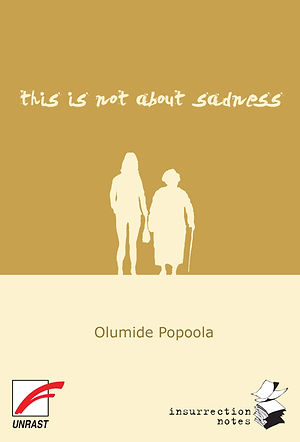
When We Speak of Nothing
“Some of the women walked so slow they were, like, floating. For real. Heads perfectly straight. Hips swaying, left, slow, right, slow, step, slow. If you didn’t concentrate you would think they weren’t moving at all, their bodies just hanging in space…”
Best mates Karl and Abu are both 17 and live near Kings Cross. Its 2011 and racial tensions are set to explode across London. Abu is infatuated with gorgeous classmate Nalini but dares not speak to her. Meanwhile, Karl is the target of the local “wannabe” thugs just for being different.
When Karl finds out his father lives in Nigeria, he decides that Port Harcourt is the best place to escape the sound and fury of London, and connect with a Dad he’s never known. Rejected on arrival, Karl befriends Nakale, an activist who wants to expose the ecocide in the Niger Delta to the world, and falls headlong for his feisty cousin Janoma.
Meanwhile, the murder of Mark Duggan triggers a full-scale riot in London. Abu finds himself in its midst, leading to a near-tragedy that forces Karl to race back home.
When We Speak of Nothing‘s fluid prose is peppered with contemporary slang and captures what it means to be young, black and queer in London.
If grime music were a novel, it would be this.

breach
breach – noun: An act of breaking or failing to observe a law, agreement, or code of conduct. A gap in a wall, barrier, or defence, especially one made by an attacking army.
breach – verb: Make a gap in and break through (a wall, barrier, or defence). (Of a whale) rise and break through the surface of the water.
‘The Jungle is like a laboratory.’
In the refugee camp known as The Jungle an illusion is being disrupted: that of a neatly ordered world, with those deserving safety and comfort separated from those who need to be kept out.
Calais is a border town. Between France and Britain. Between us and them. The eight short stories in this collection explore the refugee crisis through fiction. They give voice to the hopes and fears of both sides. Dlo and Jan break into refrigerated trucks bound for the UK. Marjorie, a volunteer, is happy to mingle in the camps until her niece goes a step too far. Mariam lies to her mother back home. With humour, insight and empathy breach tackles an issue that we can no longer ignore.
breach is the first title in the Peirene Now! series. This exciting new series will be made up of commissioned works of new fiction, which engage with the political issues of the day. In breach, the authors beautifully capture a multiplicity of voices – refugees, volunteers, angry citizens – whilst deftly charting a clear narrative path through it all. Each story is different in tone, and yet they complement one another perfectly. Taken as a whole, this stands as an empathetic and probing collage, where the words ‘home’, ‘displacement’ and ‘integration’ come to mean many things as the collection progresses to a moving finale.

Also by Mail
“… a slick and captivatingly contemporary Afro-European tale that, like jazz, is also rooted in the folkloric things that animate people. Also a story for this day and age of cultural flux and elusive ways of belonging.”
– Brian Chikwava (Harare North)
“A pioneering … powerful play, entertaining and thought-provoking.”
– Marion Kraft (The African Continuumand African American Women Writers)
“A moving tale of Nigerian-German history. Diverse experiences, expectations and hopes result in misunderstandings and breakdown. In the end it is a profound wisdom which imagines a new future new horizons for their diasporic experiences. Olumide Popoola presents us with another treasure of Afro-German literature in English.”
– Susan Arndt, Professor of English Studies and Anglophone Literatures, University of Bayreuth

“Sensitive without excessive sentimentality, this gem of a book is a deft and thoughtful this is not about sadnessexploration of trauma and its overcoming. Keenly observed, compelling and deeply moving, we’re offered a view of London life that is seldom seen.”
– Paul Gilroy
“Popoola’s novella is unique in its ability to indulge the reader in the vernacular richness of London’s immigrant communities, thrashing sound together in a way that imitates both intimate conversation and the noise of the city.”
– Natsayi Sithole (Wasafiri)
“This unencumbered prose is shaped by the grace of a writer who has an ear and eye for the complexities that lie beneath the veneer of the everyday, especially in a London neighborhood that is home to the many diasporas of colonialism. Olumide Popoola has the gift of turning a reader’s head with the sensory textures of daily encounters without ever descending into mere ‘local color’. In short, this is an exquisitely crafted study of two women who learn how to move between different worlds, how to reach across age difference, how to speak about friendship and sexuality, and how to enter those seemingly “unreachable places” of the psyche that are, as a Popoola character puts it and as one should say of her book, “impossible to dismiss.”
– Yvette Christiansë, author of Imprendehora, Castaway and Unconfessed

